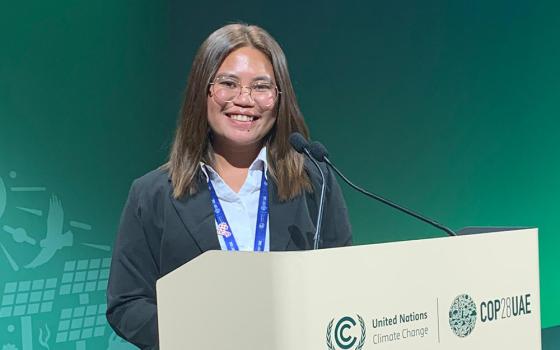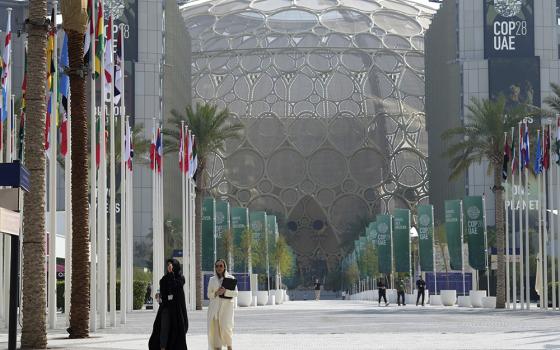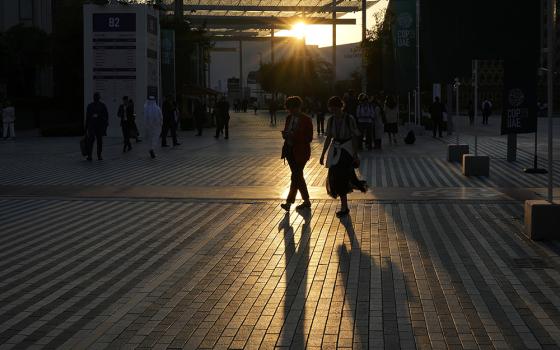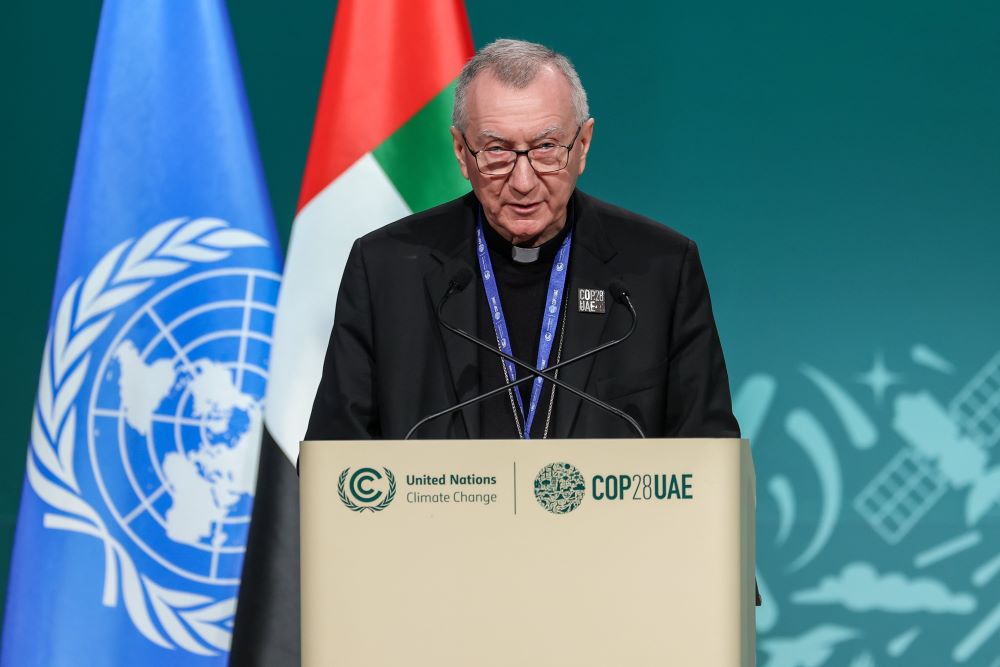
Cardinal Pietro Parolin, Vatican secretary of state, reads Pope Francis' speech at the high-level segment for heads of state and government at COP28, the U.N. Climate Change Conference Dec. 2 in Dubai, United Arab Emirates. (CNS/Courtesy of U.N. Climate Change COP28/Christopher Pike)
Delivering a message Pope Francis had hoped to offer in person, Cardinal Pietro Parolin urged the United Nations climate summit in Dubai to achieve a "breakthrough" and become a turning point for the world by charting a path for the elimination of fossil fuels.
"Now more than ever, the future of us all depends on the present that we now choose," read Parolin, secretary of state for the Holy See.
"It is essential that there be a breakthrough that is not a partial change of course, but rather a new way of making progress together," he said.
The Vatican's top diplomat spoke Dec. 2 during the second day of the opening high-level segment of COP28, where heads of state and government delivered addresses to the climate conference and the estimated 70,000 participants assembled in the most populous city in the United Arab Emirates.
Francis had been scheduled to be there in person — what would have been a first for a pope — but canceled his trip Nov. 28 on the advice of doctors as he recovers from acute bronchitis.
"Sadly, I am unable to be present with you, as I had greatly desired," Parolin read on behalf of the pope.
'Climate change signals the need for political change. Let us emerge from the narrowness of self-interest and nationalism; these are approaches belonging to the past.'
—Pope Francis
But through the cardinal, the pope still sought to deliver to world leaders and negotiators in Dubai a forceful message that alternated between encouraging and searing.
"We must answer now: Are we working for a culture of life or a culture of death? To all of you I make this heartfelt appeal: Let us choose life! Let us choose the future!"
"May this COP prove to be a turning point, demonstrating a clear and tangible political will that can lead to a decisive acceleration of ecological transition," Parolin read, "through means that meet three requirements: they must be 'efficient, obligatory and readily monitored.' And achieved in four sectors: energy efficiency; renewable sources; the elimination of fossil fuels; and education in lifestyles that are less dependent on the latter."
Burning coal, oil and gas releases heat-trapping greenhouse gases, which are the primary driver of human-caused climate change.
Numerous countries, alongside civil society groups including faith-based organizations, have pressed nations at COP28 to agree to the full phaseout of fossil fuels. That outcome is seen as unlikely, as others have proposed a "phasedown" of "unabated" fossil fuel use where emissions can't be captured before entering the atmosphere.
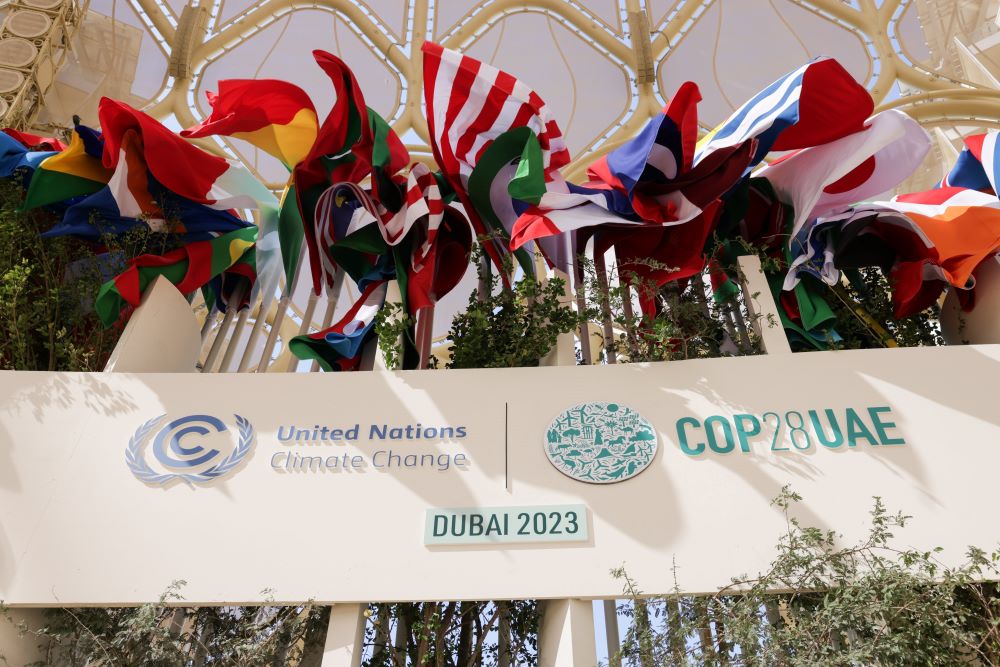
Flags can be seen inside the dome during COP28, the U.N. Climate Change Conference Nov. 30 in Dubai, United Arab Emirates. The conference runs through Dec. 12. (CNS/Courtesy of UN Climate Change COP28/Christophe Viseux)
Francis was not the only absent world leader among the 160 heads of states who took part in the high-level segment. U.S. President Joe Biden and Chinese President Xi Jinping both stayed home. Vice President Kamala Harris spoke on Biden's behalf Dec. 2 as well. Parolin read an excerpt of a longer speech the pope had prepared, which he said would be published in full.
In his remarks, the pope called the destruction of the environment "an offense against God" and a sin, "one that greatly endangers all human beings, especially the most vulnerable in our midst and threatens to unleash a conflict between generations."
Citing the war waging in Gaza between Israel and Hamas, roughly 1,300 miles from the summit, Francis bemoaned the many resources "squandered on weaponry that destroys lives and devastates our common home." He repeated a proposal from his 2020 encyclical Fratelli Tutti that money spent on war be redirected to end hunger and for climate initiatives in poorer countries.
Francis also pushed back against attempts to cast climate change as the fault of the poor and developing countries, referencing a recent Oxfam report that found the richest 10% of the world population is responsible for half of global emissions, compared to the poorest 50% contributing 8% of emissions.
"The gap between the opulent few and the masses of the poor has never been so abysmal. The poor are the real victims of what is happening," he said. He then suggested that financial debts be remitted for developing countries as a way for industrialized nations to repay the "ecological debt" he said they've incurred through polluting and exploiting natural resources.
The pope's planned appearance at COP28 would have come nearly two months after he issued Laudate Deum, an apostolic exhortation "on the climate crisis." In that document, Francis bluntly criticized the slow progress that countries have made to date in limiting global warming, and with it the devastation that comes with more severe droughts, heatwaves and storms.
On the first day of COP28, the World Meteorological Organization announced that 2023 is on track to be the hottest year on record, reaching 1.4 degrees Celsius above pre-industrial levels. Under the Paris Agreement, countries committed to reduce greenhouse gas emissions in order to limit average global temperature rise ideally to "well below" 2 C and ideally 1.5 C.
"These are more than just statistics. We risk losing the race to save our glaciers and to rein in sea level rise," WMO Secretary-General Petteri Taalas said in a statement. "We cannot return to the climate of the 20th century, but we must act now to limit the risks of an increasingly inhospitable climate in this and the coming centuries."
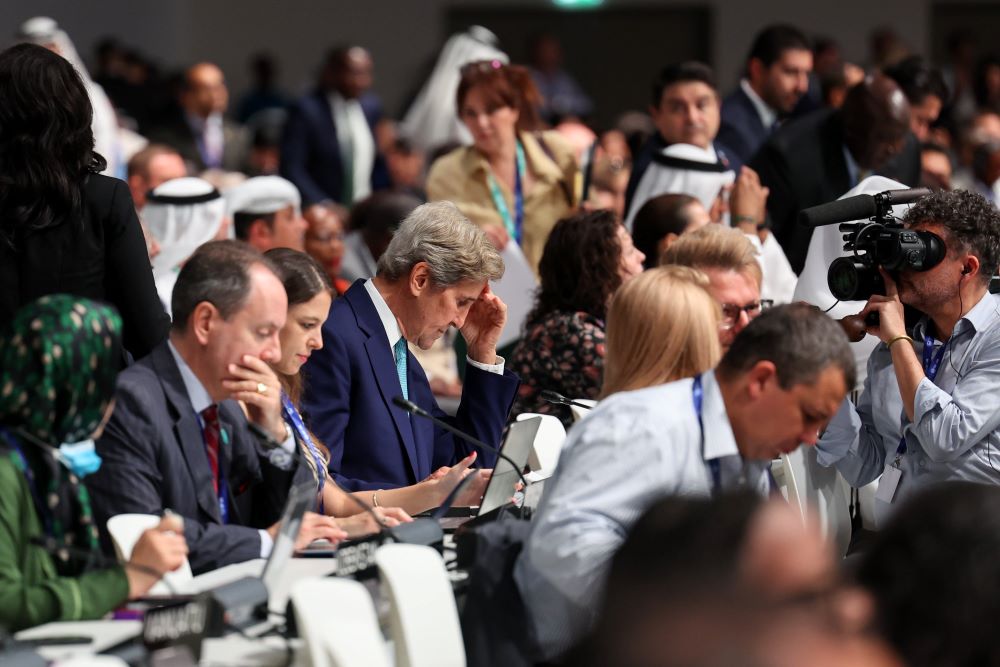
John Kerry, U.S. special presidential envoy for climate, attends the formal opening of the U.N. Climate Change Conference COP28 at Expo City Nov. 30, in Dubai, United Arab Emirates. The conference runs through Dec. 12. (CNS/Courtesy of UN Climate Change COP28/Mahmoud Khaled)
A major focus at COP28 will be the conclusion of the "global stocktake" assessing nations' progress to date in meeting the Paris goals. The process is expected to show that nations are well off pace, and while some steps have been made, emissions continue to rise and the planet is projected to double the Paris warming limit, reaching 1.5 C as early as the 2030s.
Already facing credibility questions, the 28th edition of the U.N. climate conference opened to controversy. A report by the BBC revealed that officials with host country UAE were directed to pursue oil deals with other nations in pre-COP meetings. Sultan Al-Jaber, COP28 president and head of the UAE's ADNOC national oil company, has called the report false.
In his prepared remarks, Francis repeated his criticism from Laudate Deum of the current state of multilateralism that has produced slow and incremental progress in response to climate change after nearly three decades of international negotiations.
"It is up to this generation to heed the cry of peoples, the young and children, and to lay the foundations of a new multilateralism. Why not begin precisely from our common home?" he said.
"Climate change signals the need for political change. Let us emerge from the narrowness of self-interest and nationalism; these are approaches belonging to the past. Let us join in embracing an alternative vision: this will help to bring about an ecological conversion, for 'there are no lasting changes without cultural changes.'"
He urged world leaders and negotiators to craft policies that provide "concrete and cohesive responses" to climate change. He called on government officials to demonstrate the nobility of public service. "In the end, the purpose of power is to serve," he said. "It is useless to cling to an authority that will one day be remembered for its inability to take action when it was urgent and necessary to do so."
"Please, let us move forward and not turn back," the pope pleaded, adding "History will be grateful to you."
Advertisement
While Francis could not travel to Dubai, an eight-person Holy See delegation is present. It is the second conference since the Vatican formally signed onto the Paris Agreement and joined the U.N. Framework Convention on Climate Change.
And though he did not appear in person at the world leaders' summit, the pope is set to deliver a video message Dec. 3 to help inaugurate the first-ever Faith Pavilion at a U.N. climate conference. Grand Imam Ahmed Al-Tayeb of Egypt's Al-Azhar mosque will also provide a recorded message.
Expressing hope that 2024 could mark a breakthrough, Francis ended his speech by recounting a story from his saint namesake from 800 years earlier. In 1224, Francis of Assisi, completely blind and in physical pain, composed his "Canticle of the Creatures" as a way to give praise to God for the creatures he could no longer see "but knew that they were his brothers and sisters."
"I too, who bear the name Francis, with the heartfelt urgency of a prayer, want to leave you with this message," Parolin read on behalf of the pope. "Let us leave behind our divisions and unite our forces! And with God's help, let us emerge from the dark night of wars and environmental devastation in order to turn our common future into the dawn of a new and radiant day."




